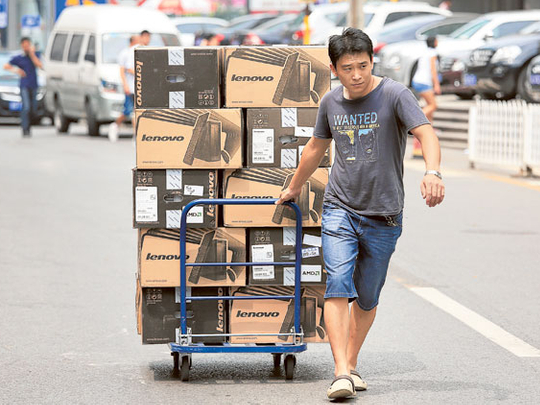
San Francisco : Hewlett-Packard Co.’s six-year reign as the world’s top personal-computer maker was ended by China’s Lenovo Group Ltd., highlighting the challenges facing Chief Executive Officer Meg Whitman as she strives to revive growth at the 73-year-old US technology company.
Lenovo, which made a deeper push into the market by acquiring International Business Machines Corp.’s PC unit seven years ago, accounted for 15.7 per cent of shipments last quarter, compared with 15.5 per cent for Hewlett-Packard, market-research firm Gartner Inc. said on Wednesday. While another firm, IDC, had Hewlett-Packard at No. 1 by a slim margin last quarter, its research also showed Lenovo closing the gap.
Hewlett-Packard, which had held the lead since 2006, lost share amid management upheaval and strategy shifts that included the possible spinoff of the PC unit, a prospect later abandoned by Whitman. The company has been harder hit by a slump caused by economic malaise and a shift away from traditional computers toward mobile devices, such as Apple Inc.’s iPad. Gains in less- developed countries are also helping Lenovo.
“Lenovo has been a beneficiary because of some of the acquisitions it’s made and its relatively high exposure to emerging markets, which are outperforming developed markets,” said Brent Bracelin, an analyst at Pacific Crest Securities. “It’s not just Lenovo, it’s part of a bigger trend across the consumer device market.”
PC slump
Global PC shipments fell 8.3 per cent from a year earlier to $87.5 million last quarter, according to Gartner. IDC reported an 8.6 per cent decline.
The figures contrast with data from the last decade, when the PC industry experienced double-digit growth most years as companies and households flocked to notebook computers. Those purchases have slumped with the advent of iPads and smartphones.
The PC industry is seeking a boost from the introduction this month of Windows 8, the new version of Microsoft Corp.’s flagship operating system.
Lenovo’s climb has been powered by hardware acquisitions and income growth in its home market, the largest for PCs and the world’s most populous nation. Market-share gains have fueled profit growth exceeding 25 per cent for 12 straight quarters. Chief Executive Officer Yang Yuanqing said in August that he won’t stop with a lead in PCs and aims to dominate in mobile devices as well.
Lenovo ‘milestone’
Lenovo this week announced a group of four computers that convert from notebooks to tablets and will run Windows 8.
Achieving the top spot is a “psychological milestone” that’s not likely to give Lenovo’s shares much of a lift because it has been widely anticipated, Dennis Lam, a Hong Kong-based analyst at DBS Vickers, said in an October 9 e-mail.
The stock fell 0.8 per cent to close at HK$6.17 in Hong Kong trading on Wednesday. Beijing-based Lenovo has gained 19 percent this year, compared with a 13 percent advance for the benchmark Hang Seng Index.
Hewlett-Packard fell 1.3 per cent to $14.18 yesterday in New York. Shares of the Palo Alto, California-based company have dropped 45 percent this year.
Hewlett-Packard’s PC sales slumped after the company said it would consider spinning off the division last summer, a decision Whitman reversed soon after taking the top job. She told analysts on the last earnings call that the company would “defend our No. 1 position” in PCs.
Intel, Microsoft
The PC-growth slowdown is also hampering technology- industry bellwethers Intel Corp. and Microsoft Corp. Intel may report its first sequential third-quarter sales drop in more than two decades, while analysts have predicted that Microsoft this quarter will suffer its first sales decline in two years.
Dell Inc. followed Hewlett-Packard as the third-biggest PC maker, with its share falling to 10.5 per cent from 11.2 per cent a year earlier, Gartner said. Acer Inc.’s share slipped to 9.9 per cent from 10.1 per cent, while Asustek Computer Inc. climbed to 7.3 per cent to 6 per cent.
According to IDC, Hewlett-Packard’s share tumbled to 15.9 per cent from 17.4 percent. Lenovo’s share climbed to 15.7 percent from 13.1 per cent.
IDC’s study includes so-called workstations, the more powerful desktop devices used for such tasks as engineering, architecture and video-game development, said Michael Thacker, a spokesman for Hewlett-Packard.
“While there are a variety of PC share reports in the market, some don’t measure the market in its entirety,” he said. IDC’s analysis “is more comprehensive.”
In the US, Hewlett-Packard, Dell and Apple were the three largest suppliers, according to Gartner.
US PC shipments declined 13.8 per cent in the quarter, Gartner said.











